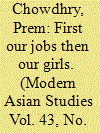| Srl | Item |
| 1 |
ID:
089383


|
|
|
|
|
| Publication |
2009.
|
| Summary/Abstract |
In the post-colonial shifting of material, legal and ideological bases, some of the given patterns of relationships between individuals and caste groups have changed and weakened because of the introduction of new, parallel and alternative structures of relationships. This change has left the dominant caste groups feeling palpably insecure in relation to the dalits. While delineating this relationship, this article seeks to argue that the cases of dalit and dominant/upper caste members' elopement and marriage represent a high point in the ongoing conflictual relationship between them, as these are viewed as forms of dalit assertion. Although many caste groups and communities are involved in inter-caste marriages and associations that defy customary norms and caste practices and have no social acceptance, it is in relation to a dalit and non-dalit association or marriage that certain aspects, which impinge on wider issues, come to the surface more pronouncedly. For the dominant caste groups such associations remain the most viable and potent issues to garner a wider collective support, cutting across class/caste/community and age divides. These cases are selectively made a public spectacle by the dominant caste groups to settle wider issues at stake verging on contemporary political and economic interests.
|
|
|
|
|
|
|
|
|
|
|
|
|
|
|
|
| 2 |
ID:
121953


|
|
|
|
|
| Publication |
2013.
|
| Summary/Abstract |
This paper offers a gendered perspective to British domination in India through the British Indian Army-which in many ways was central to their entire structure of economic and political domination in India. Locating its understanding drawn from the political economy of south-east Punjab, it argues that the designated martial castes and military recruitment structurally and ideologically identified with and privileged those trends of existing masculinities in this region which suited their power structure and empire building. It was a constellation of marital caste status, land ownership, dominant caste syndrome and good bodily physique or physical strength that ideologically came to connect and configure dominant masculinity in colonial Punjab. An Army profession fully supported it. During the two world wars it emerged as the militarized masculinity, amply supported by legal and administrative measures introduced or apparently adopted in deference to certain popular cultural practices. The associated economic and political privileges turned 'loyalty' into an inherent and special ingredient of 'masculinity' which the nationalists had to confront and deal with till such times that it came to be firmly linked with nationalism and patriotism.
|
|
|
|
|
|
|
|
|
|
|
|
|
|
|
|